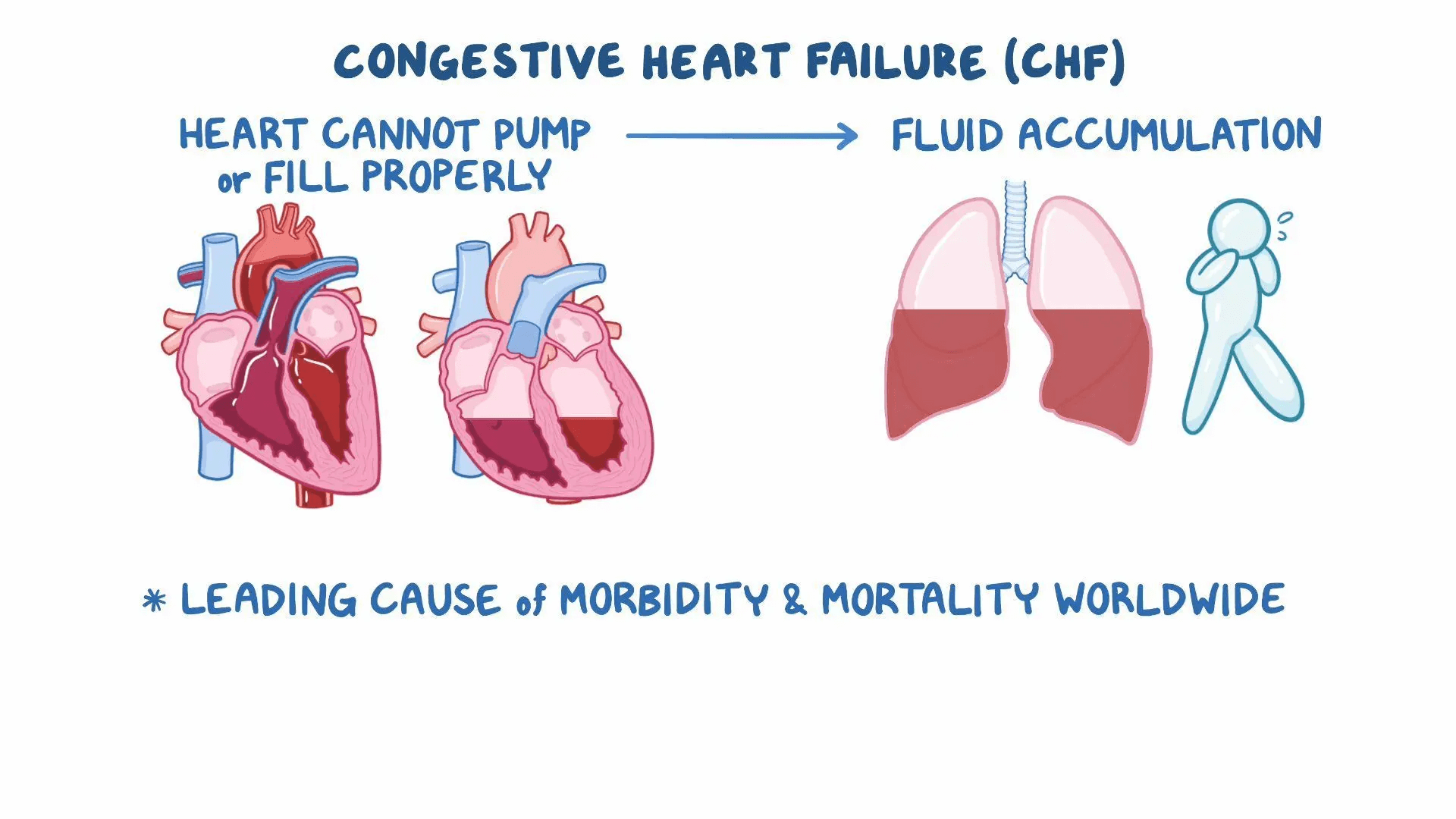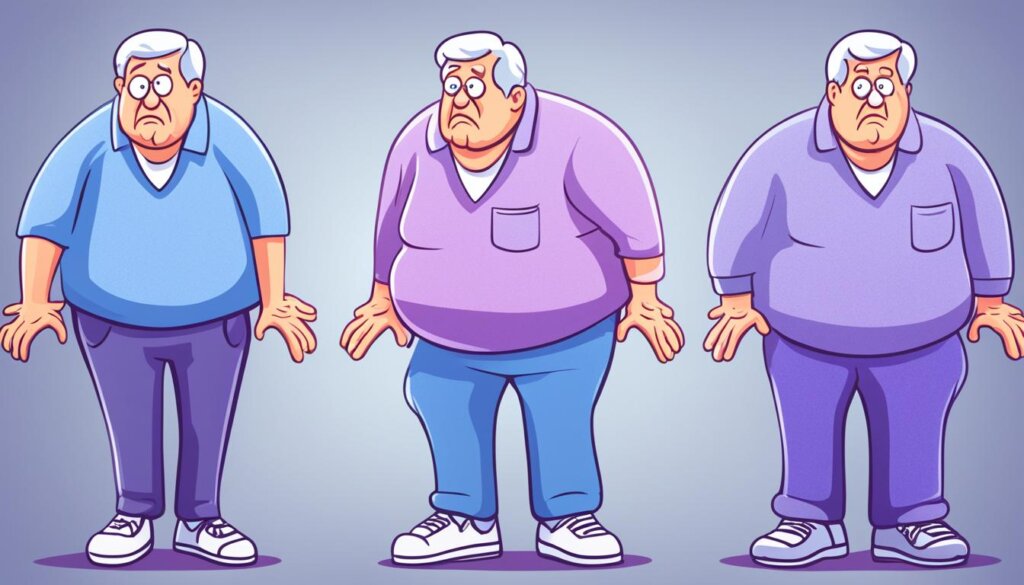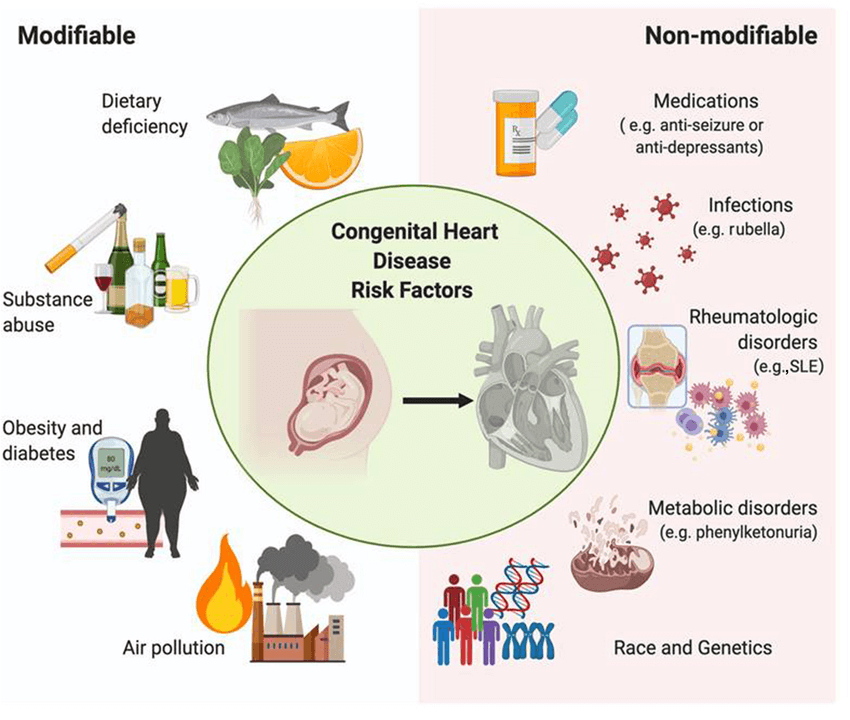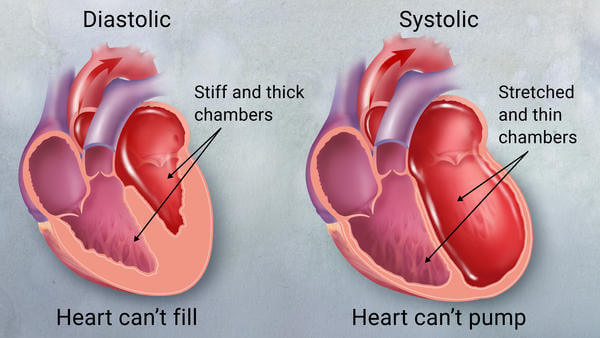FTC disclaimer: This post may contains affiliate links and we will be compensated if you click on a link and make a purchase.
About 7 million Americans have heart failure. One in four people will get it at some point. This condition, called congestive heart failure (CHF), happens when the heart can’t move blood well. This leads to fluid building up in the lungs and other parts of the body.
This can cause symptoms like shortness of breath, feeling very tired, swelling, and irregular heartbeats. Congestive heart failure can result from coronary artery disease, high blood pressure, heart valve problems, and some infections or medicines.
There are four stages of CHF, from high risk to very advanced. Treatment often includes medicines, lifestyle changes, and sometimes surgery. Finding and treating it early is key to improving the lives of those with this condition.
Key Takeaways
- Congestive heart failure is a chronic condition where the heart cannot pump blood efficiently, leading to fluid buildup in the lungs and other organs.
- There are four stages of CHF, from high risk to advanced, with varying symptoms and treatment approaches.
- Common causes of CHF include coronary artery disease, high blood pressure, heart valve problems, and certain infections or medications.
- Effective management of CHF often involves a combination of medications, lifestyle modifications, and sometimes surgical interventions.
- Early diagnosis and proper treatment are crucial for improving prognosis and quality of life for those living with congestive heart failure.
What is Congestive Heart Failure?

Definition and Overview
Congestive heart failure, also known as heart failure, is a long-term condition. It happens when the heart can’t pump blood well. This is often because the heart is weak or stiff from diseases like coronary artery disease or high blood pressure.
Because of this, the heart can’t move blood properly. This leads to fluid building up in the lungs and other areas of the body.
A healthy heart pumps out about 55% to 60% of its blood. But in heart failure, this drops a lot. Systolic failure means the heart can’t pump enough when it beats, and diastolic failure means it can’t fill up right.
Heart failure can be left-sided or right-sided. Right-sided failure often comes after left-sided failure. Symptoms include trouble breathing, feeling very tired, and swelling in the body.
“Congestive heart failure is a chronic condition in which the heart muscle cannot effectively pump blood throughout the body.”
Knowing about congestive heart failure can help people get the right medical care. It can also help manage and prevent it from getting worse.
Symptoms of Congestive Heart Failure
Congestive heart failure (CHF) has many symptoms, from mild to severe, and these symptoms can get worse without treatment. Common symptoms include shortness of breath, especially with activity or when lying down, fatigue and weakness, swelling in the legs, ankles, and feet, rapid or irregular heartbeat, reduced exercise tolerance, wheezing, persistent cough, abdominal swelling, nausea, and difficulty concentrating. The symptoms depend on the type and stage of heart failure.
Shortness of breath, or dyspnea, is a key symptom of CHF. It happens when the heart can’t pump enough blood to meet the body’s needs, especially during activity or when lying down. Fatigue and weakness also occur as the body tries to compensate for the heart’s lack of output.
Swelling, or edema, in the legs, ankles, and feet is a sign of CHF. This is because the heart can’t pump blood well, causing fluid to gather in the body’s tissues. An irregular or rapid heartbeat, known as arrhythmia, is also seen in CHF patients.
Symptom | Description |
|---|---|
Shortness of breath | This occurs due to the heart’s inability to pump enough blood to meet the body’s oxygen demands. |
Fatigue and weakness | The body struggles to compensate for reduced cardiac output |
Swelling (edema) | Fluid buildup in the body’s tissues due to the heart’s inability to effectively pump blood |
Irregular or rapid heartbeat (arrhythmia) | Commonly observed in congestive heart failure patients |
The symptoms of CHF can change a lot based on the type and stage of the condition. Catching and treating these symptoms early is key to better living and avoiding serious problems.

Causes of Congestive Heart Failure
Congestive heart failure (CHF) happens when the heart muscle gets weak or damaged. This can be due to many reasons. Some common causes and risk factors include:
Risk Factors and Underlying Conditions
- Past heart attack (myocardial infarction), which can increase the risk of developing heart failure
- Abnormal heart valves, which can lead to heart failure
- Heart muscle disease and inflammation, which can increase the risk of heart failure
- Congenital heart defects present at birth, which can result in heart failure
- Less common conditions such as severe anemia, hyperthyroidism, and abnormal heart rhythm (arrhythmia), which can also lead to heart failure
Some lifestyle choices and medical conditions can also lead to congestive heart failure. These include:
- Coronary artery disease, which can damage the heart muscle
- Diabetes, which can weaken the heart and increase the risk of heart failure
- High blood pressure, which can strain the heart over time
- Obesity, which can put additional stress on the heart
- Unhealthy behaviors such as smoking, consuming high-fat and high-sodium foods, lack of physical activity, and excessive alcohol intake all of which can elevate the risk of heart failure
Knowing the causes and risk factors for congestive heart failure is key. It helps with early detection, better management, and improving the outlook for those with this condition.

Types of Congestive Heart Failure
Congestive heart failure (CHF) can be classified into different types. These types depend on which side of the heart is affected and the underlying cause. Knowing the type of CHF is key to picking the right treatment.
Left-sided vs. Right-sided Heart Failure
Left-sided heart failure is the most common type, affecting nearly 6.2 million Americans. It happens when the left ventricle can’t pump blood to the body well. Right-sided heart failure is less common and means the right ventricle can’t pump blood to the lungs.
Right-sided heart failure might start from advanced left-sided heart failure or be caused by high blood pressure in the lungs, blood clots, or lung diseases.
Systolic vs. Diastolic Heart Failure
Congestive heart failure can also be systolic or diastolic. Systolic heart failure means the left ventricle can’t contract well to move blood. Diastolic heart failure happens when the heart muscle gets stiff, making it hard for blood to fill the heart between beats.

There are two main types: heart failure with reduced pumping ability (systolic failure) and heart failure with preserved pumping ability (diastolic failure)
Type of Heart Failure | Description |
|---|---|
Left-sided Heart Failure | The most common type is where the left ventricle cannot effectively pump blood to the body. |
Right-sided Heart Failure | Less common, involving the right ventricle’s inability to pump blood to the lungs. |
Systolic Heart Failure | The left ventricle cannot contract effectively to circulate blood. |
Diastolic Heart Failure | The heart muscle becomes stiff, leading to inadequate blood filling between contractions. |
Chronic heart failure often comes from long-term health issues like high blood pressure. Acute heart failure can happen suddenly after a big heart attack or some heart rhythm problems.
Stages of Congestive Heart Failure
Congestive heart failure (CHF) has four main stages, each with its own level of severity and symptoms. Knowing these stages helps doctors make the right treatment plans and keep track of the disease’s progress.
Stage A: High Risk for Heart Failure
Stage A is for people at high risk of getting heart failure. This includes those with high blood pressure, coronary artery disease, or diabetes but no heart damage or symptoms yet. They must be watched closely and take steps to prevent the disease from worsening.
Stage B: Pre-Heart Failure
Stage B patients have heart disease but don’t show symptoms yet. It’s important to act quickly at this stage to stop heart failure symptoms from starting.
Stage C: Symptomatic Heart Failure
Stage C means patients have symptoms like shortness of breath, tiredness, and swelling. According to the New York Heart Association system, they may not be able to do much physical activity.
Stage D: Advanced Heart Failure
Stage D is the most severe stage, with severe symptoms even when resting. Patients may need special treatments or palliative care. They often have to go to the hospital a lot and have a poor outlook if treatments don’t work.
Moving through these stages of heart failure means the condition gets worse, which is why early action and full care are key.
“The earlier heart failure is diagnosed and treated, the better the chances of slowing its progression and improving a patient’s quality of life.” – American Heart Association
Diagnosing Congestive Heart Failure
Diagnosing congestive heart failure (CHF) means checking your health, looking at your medical history, and doing tests. These tests help doctors see how your heart works and why it might fail. They also help make a plan to treat you.
Tests and Examinations
Your doctor will listen to your heart and check for fluid during a physical exam. They might also look at the veins in your neck. Here are some tests they might use:
- Electrocardiogram (ECG or EKG) to check your heart’s electrical activity
- Echocardiogram to see how your heart works and its structure
- Stress tests to see how your heart does under stress
- Blood tests for biomarkers like brain natriuretic peptide (BNP) to check for heart failure
- Cardiac imaging tests like MRI, CT, or PET scans to find problems
- Cardiac catheterization to check heart pressure and blood flow
These tests give important information to help your doctor determine what kind of heart failure you have and why.
“The echocardiogram is cited as the best test for identifying heart failure type and monitoring the condition for treatment guidance.”
Your doctors can make a detailed plan based on your test results, medical history, and physical exam. This plan will help manage congestive heart failure and keep your heart healthy.
Treating Congestive Heart Failure
Congestive heart failure is a complex condition that needs a detailed treatment plan. The main goals are to manage symptoms, slow the disease, and improve life quality. Medications are key in treating it, with diuretics, ACE inhibitors, ARBs, beta-blockers, and anticoagulants being common.
Medications for Heart Failure
Diuretics reduce fluid buildup. ACE inhibitors and ARBs lower blood pressure and ease the heart’s workload. Beta-blockers slow the heart rate and boost the heart’s pumping power. Anticoagulants prevent blood clots and lower stroke risk.
Surgical and Device Treatments
Advanced treatments like cardiac resynchronization therapy, implantable cardioverter-defibrillators, or heart transplants may be needed.
Cardiac resynchronization therapy uses a pacemaker to help the heart’s ventricles beat together better. Implantable cardioverter-defibrillators fix abnormal heart rhythms. For severe heart failure, a heart transplant might be the best choice, with good success rates.
The treatment plan for congestive heart failure is made for each patient. It considers the cause, disease stage, and overall health. Many can manage their condition and live better with the right mix of medications, lifestyle changes, and sometimes surgery or devices.
Lifestyle Changes for Managing Congestive Heart Failure
Healthy lifestyle changes can improve the management of congestive heart failure (CHF). Eating right and exercising regularly can boost one’s quality of life and slow down the condition’s progress.
Watching your weight is key. Gaining or losing weight quickly can mean your heart failure is getting worse. A balanced, low-sodium diet can help keep fluids down and ease symptoms.
Exercise is vital for CHF care. Activities like brisk walking or light jogging can strengthen your heart and boost your fitness. Research shows that exercises like high-intensity interval training and Tai Chi help CHF patients improve their exercise skills, feel better, and improve their heart function.
Handling stress well is also important for a healthy life with CHF. Meditation, therapy, or other relaxation methods can help you cope with stress and keep symptoms under control.
Stay away from harmful things like tobacco and too much alcohol. These can hurt your heart and blood vessels, making things worse.
By making these lifestyle changes, you can help manage your congestive heart failure better. Always talk to your doctor to create a plan that fits your needs and goals.
Preventing Congestive Heart Failure
While we can’t always stop congestive heart failure (CHF), we can lower our risk. Keeping a healthy lifestyle and managing health issues early helps. This can delay CHF from happening.
One way to fight CHF is by changing our lifestyle. Exercise, eating right, and avoiding smoking and too much alcohol are key. Also, managing health issues like high blood pressure and diabetes is vital.
Regular doctor visits and early intervention are key to preventing CHF. Catching health problems early, like high blood pressure and diabetes, helps a lot. Working with doctors to monitor heart health lowers your CHF risk.
To sum up, we can’t fully prevent CHF, but we can lower our risk. A healthy lifestyle, managing health issues, and acting early are key. These steps help prevent congestive heart failure.
Congestive Heart Failure Prognosis and Outlook
The outlook for people with congestive heart failure (CHF) varies a lot. It depends on the cause, stage, and how well the treatment works. Research shows that being younger at diagnosis helps. People under 65 have a 5-year survival rate of 78.8%, while those over 75 have 49.5%.
The type and severity of CHF also affect the prognosis. A lower heart function means a tougher outlook. In Stage D, with severe symptoms, life expectancy is 6 to 12 months.
Managing CHF well can make a big difference. This includes eating right, exercising, and managing stress. New treatments like Sodium-glucose cotransporter 2 (SGLT2) inhibitors, Angiotensin receptor-neprilysin inhibitors, and implantable devices are helping too.
CHF is serious but can be managed with early detection and the right treatment. Making lifestyle changes helps a lot. Research and new treatments give hope to those with CHF.
Factors Influencing Congestive Heart Failure Prognosis
- Age at diagnosis: Younger individuals (under 65) generally have better 5-year survival rates than older adults (over 75).
- Ejection fraction (EF): Reduced EF is associated with a more challenging prognosis than preserved EF.
- Underlying health conditions: Comorbidities like hypertension, diabetes, and socioeconomic factors can impact CHF risk and outcomes.
- Stage of CHF: Individuals in the advanced Stage D typically have a shorter life expectancy than those in earlier stages.
- Treatment effectiveness: Personalized treatment plans, including medications and interventions, can significantly influence prognosis.
- Lifestyle modifications: Adopting a healthy diet, regular exercise, and stress management can help slow CHF progression and improve quality of life.
Healthcare providers can help people with CHF by making a detailed plan. This can improve their outlook and prognosis.
Living with Congestive Heart Failure
Living with congestive heart failure (CHF) can be tough, but many people manage well with the right support and care. It’s important to watch for symptoms, follow your treatment plan, and make lifestyle changes. Joining support groups, talking openly with doctors, and finding ways to reduce stress greatly help.
Even though CHF is a long-term condition that gets worse over time, you can still manage it well. Changing your habits, like what you eat and how you exercise, can make you feel better. Getting emotional support and learning more about your condition can also help you handle symptoms better and improve your quality of life.
Groups like the American Heart Association greatly help patients and their families with CHF. They provide information on handling symptoms, navigating healthcare, and finding community programs. As more resources and education are available, people with CHF can find the support they need to live well.
Recommended Lifestyle Changes for CHF Patients | Benefits |
|---|---|
Eat a diet rich in fruits, vegetables, and whole grains | It provides essential nutrients and helps manage symptoms |
Limit alcohol intake to no more than 14 units per week | Reduces strain on the heart and supports overall health |
Get an annual flu vaccine and one-off pneumococcal vaccination | It helps prevent infections that can worsen heart failure |
Attend regular check-ups with healthcare providers | Allows for close monitoring and timely adjustments to treatment |
By making these lifestyle changes and getting support, people with congestive heart failure can take charge of their health and feel better overall.
“With the right approach and support, individuals with congestive heart failure can learn to manage their symptoms and maintain an active, fulfilling life.”
Conclusion
Congestive heart failure (CHF) makes it hard for the heart to pump blood well.1 kjk> It’s a big health issue, with almost 6 million people in the U.S. affected. Causes include things like heart disease, high blood pressure, and valve problems. These can cause symptoms like shortness of breath, tiredness, and swelling.
Getting CHF diagnosed early and treated is key. This includes medicines, changing your lifestyle, and sometimes surgery. Even with these steps, CHF is still a big concern. But, with the right care, many people can live well and slow the disease’s progress. As people live longer and risk factors increase, more people will get CHF. Costs for CHF care are expected to double by 2030.
In summary, CHF is a major health issue that requires a comprehensive approach. Knowing about its causes, symptoms, and treatments helps doctors and patients collaborate, which can improve the lives of those with this chronic condition.
FAQ
What is congestive heart failure?
Congestive heart failure is a long-term condition caused by a weak heart that cannot pump blood efficiently. This leads to fluid buildup in the lungs and other organs.
This causes symptoms like shortness of breath, feeling tired, swelling, and irregular heartbeats.
What are the common symptoms of congestive heart failure?
Symptoms include shortness of breath, especially when active or lying down. You might feel tired and weak. Swelling in the legs, ankles, and feet is common too.
Other symptoms are a rapid or irregular heartbeat, trouble exercising, wheezing, and a persistent cough. You might also have abdominal swelling, nausea, and trouble concentrating.
What are the main causes of congestive heart failure?
It’s often caused by conditions that weaken or damage the heart muscle. These include coronary artery disease, heart attacks, and high blood pressure.
Other causes are heart valve problems, certain infections, and congenital heart defects. Risk factors also include diabetes, obesity, sleep apnea, too much alcohol, and certain medications.
What are the different types of congestive heart failure?
Different types are based on which side of the heart is affected and the underlying cause. The main types are left-sided, right-sided, systolic, and diastolic heart failure.
What are the stages of congestive heart failure?
It’s divided into four stages: Stage A (high risk for developing heart failure), Stage B (structural heart disease but no symptoms), Stage C (current or past symptoms of heart failure), and Stage D (advanced heart failure with severe symptoms).
How is congestive heart failure diagnosed?
Diagnosis involves a physical exam, medical history, and tests. These tests include electrocardiograms, echocardiograms, stress tests, blood tests, cardiac MRI, and cardiac catheterization.
What are the treatment options for congestive heart failure?
Treatment includes medications, lifestyle changes, and sometimes surgery or devices. Diuretics, ACE inhibitors, ARBs, beta-blockers, and anticoagulants are common medications.
Advanced treatments might be cardiac resynchronization therapy, implantable cardioverter-defibrillators, and heart transplants.
What lifestyle changes can help manage congestive heart failure?
Changes include keeping a healthy weight, exercising, eating a low-sodium diet, managing stress, and avoiding alcohol and tobacco. It’s important to watch your vital signs and follow your treatment plan.
Can congestive heart failure be prevented?
It can’t always be prevented, but you can lower the risk by maintaining a healthy lifestyle, managing conditions like high blood pressure and diabetes, and seeking early treatment for heart issues.
What is the prognosis and outlook for individuals with congestive heart failure?
The prognosis depends on the cause, stage, and treatment response. Early diagnosis and effective management improve the outlook. But, it’s a progressive condition, and the outlook worsens in advanced stages.








